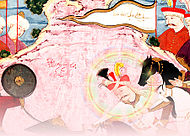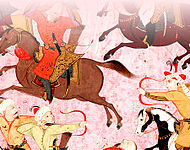- Dedes
-
For the former Greek footballer, see Jiorgos Dedes.

Beliefs Haqq-Muhammad-Ali
Four Doors · Al-Insān al-Kāmil
Qur'an · Buyruks
Sufi metaphysics
Zahir · BatinPractices Fasting · Sama · Music
Zakat · Ziyarat · Taqiyya
Düşkünlük Meydanı
Nowruz · Ashura
HıdırellezThe Twelve Imams Ali · Hasan · Husayn
al-Abidin · al-Baqir · al-Sadiq
al-Kadhim · ar-Rida · al-Taqi
al-Naqi · al-Askari · al-MahdiFigures Muhammad-Ali · Khatai
Ibn ʿArabī · Mansur Al-Hallaj
Hacı Bektaş-ı Veli · Balım Sultan
Yunus Emre · Pir Sultan Abdal
Otman Baba · Gül BabaLeadership Groups 
A dede is a socio-religious leader in the Alevi community. The institution of dede is the most important of all the institutions integral to the social and religious organization of the Anatolian Alevis. Although much weakened as a result of the socio-economic transformation experienced in Anatolia towards the end of the nineteenth century, and particularly due to accelerated migration from the rural to the urban areas after the foundation of the Turkish Republic, it played a primary role in the survival of Alevism until today.
The institution of dedes is based on a three tiered hierarchy:
In some regions this hierarchy is modified in such a way that the Pir and Murshid change places. This is exclusively a functional hierarchy, as all involved come from a dede family. They fulfill functions that are complementary in nature, and would be meaningless in isolation from each other. The dede families, all of them called 'ocakzades', have distributed these duties among themselves.
Contents
Qualifications
According to the books of the Buyruk which include the basic principles of the Alevi faith, and the traditions that survive among the Alevis, a dede must have the following qualifications:[1]
- To be a descendant of the Prophet (ocakzade).
- To operate as an educator and a moral guide (mürebbi) for the community.
- To be knowledgeable and exemplary in his character and manners (insan-i kamil).
- To follow the principles written in the Buyruks, as well as the established traditions of Alevism.
Functions
The main functions of the dedes can be summarized as follows:
- To guide and enlighten (irşad) the community in social and religious matters.
- To lead the religious rituals.
- To punish the criminals, and to serve as an arbiter between conflicting sides.
- To lead ceremonies during occasions such as a wedding or a funeral.
- To fulfill certain legal and educational functions.
- Provide health provisions.
- Provide socio-political leadership.
- In some exceptional cases, such as in the Dersim province,[2] dedes share the leadership position with the large landowners, the Agas.
Legal Functions
For Alevis, “YOL” [path] is a very important concept. The pedigrees of the dedes consistently emphasize this by saying “Yol cümleden uludur” [the Path is the most exalted of all].[3] What is important is the “Yol” and not the personal desires and needs of an individual Alevi. All the latter are possible only in conformity with the former. Otherwise, the institution of düşkün would be activated. In other words, an Alevi would become a düşkün if he tries to satisfy his desires and needs without regard for the “Yol’. As Prof. Yusuf Ziya Yörükan noted “…Dede declares one a düşkün by saying to him ‘may your face be darkened’. Any more that person is deprived of the law of men….”[4]
The following are major crimes that lead one to the state of düşkün:[5]
- killing a person
- committing adultery
- divorce
- marrying a divorcee
- stealing
References
- ^ On the issue of the qualifications and functions of dedes, Peter J. Bumke gives valuable information. Bumke, ibid, pp. 18-21
- ^ Officially today there is no province called Dersim. For centuries, Dersim maintained a kind of autonomy under the leadership of the tribal chiefs, and covers a region that includes the provinces of Erzincan, Tunceli and parts of Sivas. In 1937, the name of Dersim was changed to Tunceli.
- ^ This and similar expressions are frequently encountered in the secere of the Ocak of Ali Abbas.
- ^ Yusuf Ziya, “Tahtacılar, Tahtacılarda Dini ve Sırri hayat’, DARÜLFÜNUN İLAHİYAT FAKÜLTESİ MECMUASI, year: 4, no: 15, May 1930, p. 75
- ^ Also see, Öztürk, ibid, pp. 78-81. In the old days, marrying a Sünni [Yezide kuşak çözmek] was also accepted as an offense that led to the state of düşkün. See Alevi Buyruks
Categories:- Alevism
- Islam in Turkey
- Religious leadership roles
- Turkish culture
Wikimedia Foundation. 2010.
